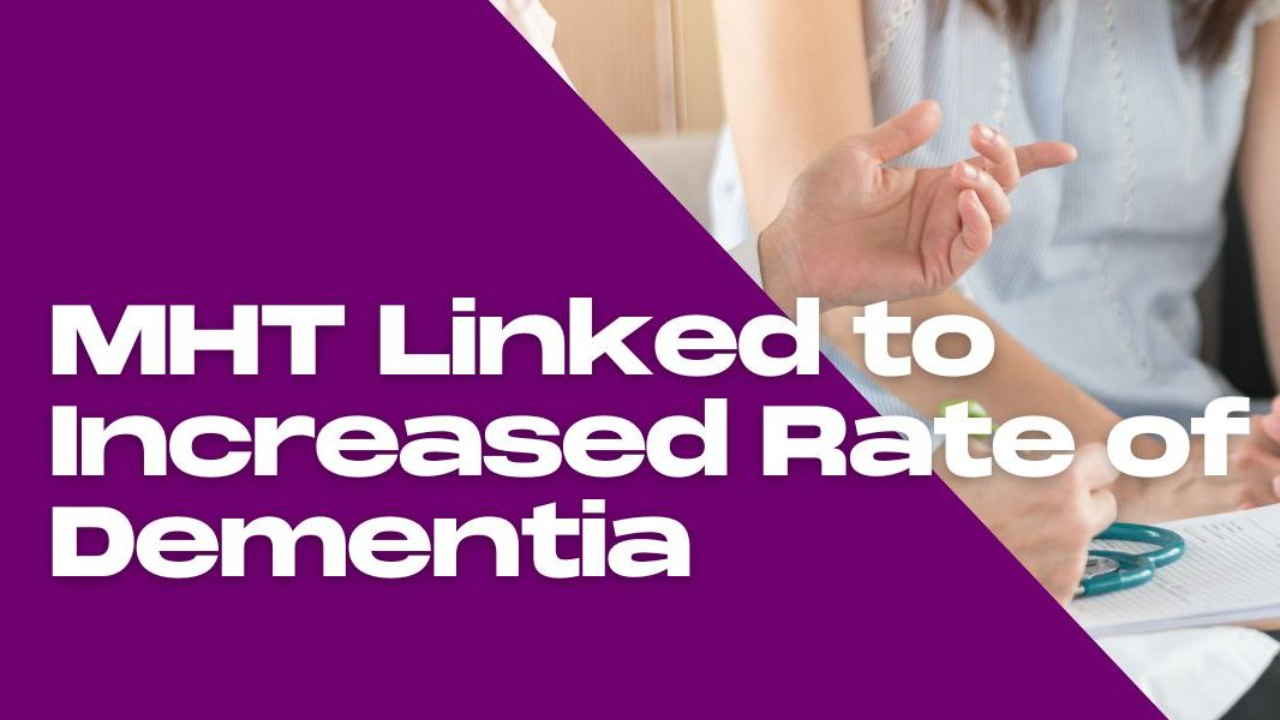
New Research Reports a Link Between MHT Use and Increased Rate of Dementia
Jun 28, 2023This new research doesn't mean menopausal hormone therapy causes dementia, just that we have a lot yet to learn.
By Selene Yeager
The use of menopausal hormone therapy (MHT) is associated with an increased rate of dementia and Alzheimer’s disease in both long-term and short-term users, according to a large study published by The BMJ this week.
Before going any further, it’s always important to note that correlation does not equal causation. So, nobody is saying that hormone therapy causes dementia here. In fact, a related editorial published in The BMJ states, "A causal link remains unlikely." But these associations are obviously important to understand and investigate, especially as many women ponder if they should be using hormone therapy for disease prevention purposes.
For this study, researchers in Denmark analyzed national registry data to assess the association between the use of combined estrogen and progestin (synthetic progestogen) therapy and the development of dementia according to the type of hormone treatment, duration of use, and age at use. They identified 5,589 women with dementia and 55,890 age-matched women without dementia between the years 2000 and 2018 from a population of Danish women aged 50 to 60 years old in 2000 with no history of dementia or underlying reasons to prevent them from using MHT. They also took into account other relevant factors including hypertension, diabetes, education, and thyroid disease.
The average age that the women with dementia were diagnosed was 70. After analyzing the data, the researchers found that, compared with women who had never used MHT, those who had used combined estrogen-progestin MHT had a 24 percent increased rate of developing all cause dementia and Alzheimer’s disease, including women who received hormone therapy when they were 55 or younger. Longer use was associated with higher rates of disease development, with women using MHT for more than 12 years having a 74 percent increased rate. The increased rates were similar between MHT taken daily and taken cyclically (daily estrogen with progestin taken 10 to 14 days a month).
The use of progestin-only therapy and local vaginal estrogen therapy were not associated with an increased rate of development of dementia. The study did not isolate vascular dementia from other types of dementia. It also didn’t distinguish between forms of delivery like patches or oral therapies. This study also did not address those with surgical menopause.
It bears repeating that this in no way means hormone therapy causes dementia. It’s simply a study that adds to the growing body of research on how hormones—both your body’s own and the ones you take supplementally—influence your brain health. And this research is growing steadily. (If you want to dive deep in this topic, Dr. Lisa Mosconi is doing amazing work in this area.)
The bottom line at this time is that the scientific evidence on MHT and brain health is still mixed with other studies finding decreased risk or neutral effects. A study published earlier this year found that MHT is associated with higher memory scores and larger brain volume in women with the dementia-risk-elevating APOE4 genotype. That wasn’t the case for the non-APOE4 carrying women, however. In non-APOE4 carriers, amygdala volumes were smaller in MHT users compared to non-users. Another study published in 2021 in The BMJ found no increased risk for developing dementia overall, and a slightly increased risk of developing Alzheimer’s disease among long-term users of estrogen-progestogen therapies. And now, this study.
You get the picture.
MHT is a tremendously effective tool for women who have life-disrupting menopausal symptoms. It can help prevent bone loss for those at risk for osteoporosis. Millions of women credit it for giving them their quality of life back during and beyond the menopause transition. And nothing we take, including MHT, is without potential negative side effects. The NAMS guidelines don't promote hormone therapy as a preventative measure against dementia because the research is still inconclusive.
There’s a lot to tease out with this latest study. It’s important to remember that women using hormone therapy may have more severe vasomotor symptoms (aka hot flashes and night sweats) and a predisposition to dementia, as hot flashes are linked to white matter hyperintensities (lesions) in the brain. Women, including the ones in this study, often seek hormone therapy for brain fog issues. Hormone therapy has evolved a lot over the years.
As the researchers conclude: “Further studies are warranted to determine whether these findings represent an actual effect of menopausal hormone therapy on dementia risk, or whether they reflect an underlying predisposition in women in need of these treatments.” That's an important distinction to determine.
In the meantime, the best course of action is to weigh the pros and cons of hormone therapy for yourself and work with your provider to determine the best course of action for your personal needs.
Get Feisty 40+ in Your Inbox
We hate SPAM. We will never sell your information, for any reason or send you emails that suck!


